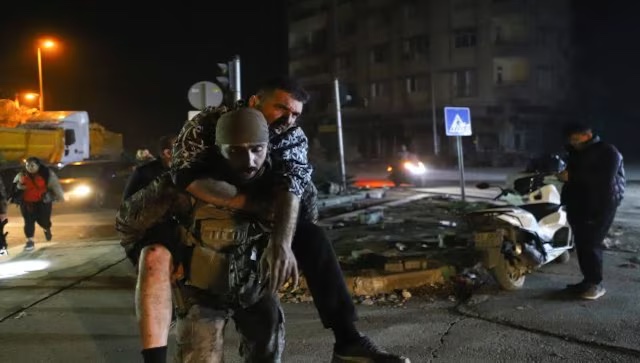
Authorities reported that a new 6.4-magnitude earthquake struck Turkey on Monday, killing three people and injuring more than 200 in areas devastated by a massive quake two weeks prior that killed tens of thousands.
Authorities reported that a new 6.4-magnitude earthquake struck Turkey on Monday, killing three people and injuring more than 200 in areas devastated by a massive quake two weeks prior that killed tens of thousands. More buildings fell, trapping some people, and Syria, a neighbor, also recorded scores of injuries.
The town of Defne in Turkey’s Hatay province, which was one of the worst-hit areas in the magnitude 7.8 quake on February 6, was the epicenter of the quake on Monday. It was felt in Syria, Jordan, Cyprus, Israel, and Egypt, as well as a second earthquake of magnitude 5.8.
According to Turkish Interior Minister Suleyman Soylu, 213 people were injured and three died. Six people were believed to be trapped in three collapsed buildings, which were the focus of search and rescue efforts.
According to HaberTurk television, police in Hatay rescued one person trapped inside a three-story building and were attempting to reach three others inside. It said that movers who helped people move furniture and other belongings from the building that had been damaged by the huge earthquake were among those trapped.
Six people were injured in Aleppo by falling debris, according to SANA, the state news agency of Syria. The civil defense organization known as the White Helmets in northwest Syria reported more than 130 injuries, the majority of which were not life-threatening. These injuries included fractures and instances of people fainting from fear. Additionally, several buildings in areas that had already been damaged by the earthquake gave way.
Nearly 45,000 people were killed in the quake on February 6 in both countries. The majority of those killed were in Turkey, where over a million and a half people are staying in temporary shelters. Since then, Turkish authorities have recorded over 6,000 aftershocks.
According to HaberTurk journalists reporting from Hatay, they were violently shaken by the earthquake on Monday and held onto one another to avoid falling.
Alejandro Malaver, a witness in the Turkish city of Adana, said that people left their homes and went out into the streets, bringing blankets into their cars. Malaver stated that “no one wants to get back into their houses” and that everyone is extremely afraid.
Mehmet Salhaoglullari, who hails from a village near Samandag, claimed that he was eating at a restaurant when the building started shaking.
He stated, “We continued to shake outside as we all threw ourselves outside.”
Fearful residents of the Syrian city of Idlib were getting ready to sleep in parks and other public areas while fuel lines grew at gas stations as people tried to get away from any buildings that might fall.
Hospitals in northern Syria run by the Syrian American Medical Society said they had treated a number of patients, including a 7-year-old boy, who had heart attacks caused by fear after the new quake.
Earlier on Monday, President Recep Tayyip Erdogan paid a visit to Hatay and announced that his government would begin building close to 200,000 new homes in the quake-ravaged region as soon as the following month.
Erdogan stated that the new structures would be no taller than three or four stories, constructed on firmer ground, in accordance with higher standards, and after consulting with “geophysics, geotechnical, geology, and seismology professors” and other specialists.
The leader of Turkey stated that demolished cultural landmarks would be rebuilt in accordance with their “historic and cultural texture.”
Erdogan stated that approximately 1.6 million individuals are currently staying in temporary shelters.
On Monday, the disaster management agency in Turkey, AFAD, reported an increase to 41,156 confirmed deaths as a result of the earthquake on February 6 in Turkey. That brought the total number of deaths in Turkey and Syria to 44,844.
In the majority of the quake zone, search and rescue efforts for survivors have been suspended; however, AFAD chief Yunus Sezer stated earlier that search teams were continuing their efforts in more than a dozen collapsed buildings, the majority of which are in Hatay province.
No indications of anybody were being alive under the rubble since three individuals from one family — a mother, father and 12-year-old kid — were extricated from an imploded working in Hatay on Saturday. The boy died later.
According to the authorities, more than 110,000 buildings in 11 Turkish provinces that were affected by the quake on February 6 were either destroyed or severely damaged to the point where they needed to be demolished.
On Monday, the health agency of the European Union issued a warning regarding the possibility of disease outbreaks in the coming weeks. “Food and water-borne diseases, respiratory infections, and vaccine-preventable infections are a risk in the upcoming period, with the potential to cause outbreaks, particularly as survivors are moving to temporary shelters,” stated the Centers for Disease Control and Prevention.
“In the upcoming week, there is a significant possibility of a surge in cholera cases in the affected areas.